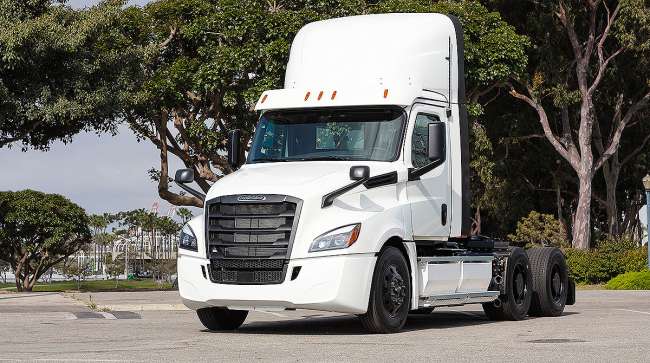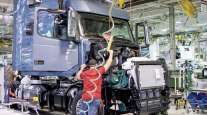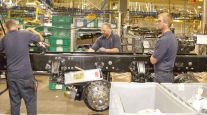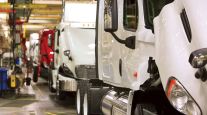Senior Reporter
Class 8 Orders Slump for Weakest November Since 2015

[Stay on top of transportation news: Get TTNews in your inbox.]
Preliminary North American Class 8 net orders for November passed 17,000 and hit the second-highest point reached this year, but analysts at two data-tracking firms said it did nothing to alter the slumping direction of the overall trend.
Orders were 17,500, ACT Research reported, noting it would have final net orders from truck makers later in the month.
Preliminary North America Class 8 net order data show the industry booked 17,500 units in November, down 20% from October. #truck #semitruck #trucking #transportation https://t.co/0jsnNpSJCH pic.twitter.com/7M2xXahgpn
— ACT Research (@actresearch) December 4, 2019
November’s tally trailed only October’s volume of 22,100 for the year, but dropped far below the 28,082 net orders a year earlier. It was the weakest November total since 16,770 in 2015, according to ACT.
Orders year-to-date have averaged about 14,600 per month.
“Usually the first and fourth quarters of the year are the strongest order quarters, so seeing slightly elevated activity is, I’m not saying encouraging, but affirming [of ACT’s forecast of North American production],” ACT Vice President Steve Tam told Transport Topics.
“17,500 is a pretty decent number,” he said. “Averaging 16,000 or 17,000 a month is our expectation as we roll into the 2020 time frame.”
ACT’s forecast expects North American production to reach 345,000 this year, but the company is “increasingly nervous” about trade and U.S.-China tariff situations, Tam said Dec. 4. As it stands now, ACT has forecast production in 2020 will plunge by more than 100,000 units to 233,500 — but that figure lands close to the typical North American replacement level.
ACT was set to release its latest forecast Dec. 6, which may reflect adjustments.
In terms of historical cycles and manufacturing-led slowdowns “assuming things are going to transpire as our forecast portrays, this is a very middling downturn relative to others, and 2016 is the closest,” Tam said. “They are almost identical in magnitude. This is going to be not quite as steep as the 2015-2016 downturn, and the trajectory during the cycle-year is pretty consistent.”
Separately, FTR pegged preliminary orders at 17,300.
“I call this a disappointing number because it doesn’t keep production running well in 2020,” said Don Ake, vice president of commercial vehicles at FTR.
Fleets and others “are very cautious. They are only ordering out into the first quarter [of 2020], primarily,” he added. “They are more cautious than they were in 2015-2016, really. The fourth quarter this year has not gotten off to a strong start. It’s winding down a lot.”
December’s orders, due to be reported in early January, should be higher, but may not be a lot better because the caution factors that held back November will still be present, Ake said.
In addition to declines in manufacturing, slower freight growth and softening rates, Ake also pointed to what he called “political conflict. Everybody can go, ‘yes, that’s present.’ And then they figure it out as to how it’s present in their own mind.”
These uncertainties weigh on decisions to add equipment, and one fleet recently emphasized its orders for electrified trucks; NFI was the first fleet to receive a Class 8 eCascadia from Daimler Trucks North America.
“The Daimler partnership has gone back many, many years. We are driving our first eCascadia in Southern California,” said Bill Bliem, senior vice president of fleet services at NFI. The company is based in Camden, N.J.
NFI ranks No. 19 on the Transport Topics Top 100 list of the largest for-hire carriers in North America. It ranks No. 10 on the TT list of the 50 largest logistic companies in North America.
“We have nine more eCascadias coming before the end of the year,” said Bliem. “So we are going to have a fleet of 10, and the plan is to run them through our warehouse complex in the Inland Empire and through the [Southern California] ports and feed all that information to Daimler so they can get these trucks into production in 2021.”
At the same time, he said NFI has 10 Tesla battery-electric heavy-duty trucks on order. It is also running an electric tractor from Peterbilt Motors Co., a unit of Paccar Inc., and has ordered 25 electric yard tractors from Kalmar Ottawa to be built and delivered in the first quarter of 2020.
In addition, the company is participating in the Volvo Lights program aimed at reducing emissions and cleaning the air in California, he said.
“There are 16 partners in the program,” Bliem said. “We are the truck operator. We will be operating four Volvo electric trucks, two electric yard tractors and 10 lithium battery-powered forklifts through the Volvo Lights program.”
Of course, not every fleet places truck orders, relying instead on truck leasing.
“We lease all our equipment,” said John Hernando, CEO of InstiCo Logistics and InstiCo Express, based in Irving, Texas. “We have full-service leases. There’s multiple reasons why we did that. [One is] we don’t have our own shops. So it gives us a better opportunity to get the maintenance we need from the suppliers we partner with.”
Want more news? Listen to today's daily briefing:




